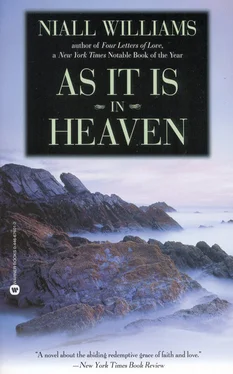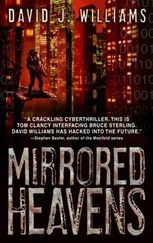Since he made the pact with God in the hospital, he had had little chance for good deeds. He had tried to do what the nurses told him, had eaten the mild-flavoured yogurt-like food that slid like wet paste in his throat, and not pressed the call button when Healy in the bed beside him stole his sleep by venting all night his repressed anger in urgent, snapping snores and bulbous farts. But Philip feared that this was not enough. It was when he was home again in the empty house behind the chestnut tree that he knew he must get under way a daily practice of goodness. What it might be, or how he might achieve it, he had no idea. Vaguely he supposed that it would be something to do with the people he would meet that he would see things in the course of an ordinary day, and that all that could be expected of him would be to react in as kind and generous a manner as he could.
On his third full day home he left the house in the afternoon with the painkiller still dissolving on his tongue and drove into the city centre. For the first time in years he did not drive the car with any impatience or haste, but motored instead through the begrimed streets like a Sunday driver in the pastoral quietude of a country lane. He waved like a mad uncle at passersby. He touched the brim of his hat at a mother and child on a pedestrian crossing, and allowed cars to pull out of side streets in front of him. While the painkiller made numb his inner organs, he smiled at Dublin and softly whistled “Dixie” when the car in front of him took the last space on Stephen’s Green. He wanted to park nowhere else, and so contented himself by driving around the green park repeatedly. When at last he found a space, it was the middle of the afternoon. Philip stepped out onto the path. Goodness, he thought. Acts of goodness. He moved along the path with pleasantness on his face. He prepared a kind of wordless greeting in his raised eyebrows and gave it continuously to the people coming against him, hoping that it was not misunderstood and that God was watching. When he had greeted a hundred Dubliners like this along the top of Stephen’s Green, he took their lack of acknowledgement as a judgement and headed down to the crush and hurry of Grafton Street with a growing awareness of how difficult goodness was going to be.
When he reached the traffic light at the top of the street, the wind pressed on his back and he had to hold on to his hat. In that instant the light changed and the people hurried across past him. He was left standing there, and felt the pulling away of life. He didn’t move, and the light changed again. It was a moment before another cluster of people gathered around him. He gave some of them small smiles and a parcel of nods, but they paid him — an odd little man holding his hat at the traffic lights — no attention. As the light changed once more, a woman with two young children was on the kerbside next to him. Philip Griffin offered a child his hand to cross the street, but the mother drew away the child at once and was gone.
Again he stood there and did not move. He watched the city, the city he was born in. He watched its grey relentless tide of forlorn faces, the figures of the windblown and harried, dispossessed of dreams, hastening along the street in the narrowness of shopping and getting home. He heard the noise of people and traffic and knew how each one was lost in the privacy of his own pursuit, not noticing one another. No hand reached out to touch him. The lights changed three times while he stood on the edge of Stephen’s Green. Courier cycles flew past. A taximan paused his cab and waved the old man to cross, but Philip Griffin declined. He was stilled on the point of an epiphany, and as the first spits of rain hit the crown of his head, he imagined that he saw only for the first time the vast monstrosity of selfishness and meanness that had become the world. Across the street he could read the headlines of the evening papers: TAKEAWAY KILLING. FATHER RAPIST. The city he was born in was now this, and Philip Griffin had to hold on to the traffic light for something solid.
It was raining heavily now, and darkness was descending rapidly into the afternoon.
Philip’s face was wet when he turned to walk back to his car, defeated. He had thought that if he walked into the centre of the city his footsteps would be guided to the person who was in need of his help. But nothing had happened. There was a woman sitting on the ground begging, not far from the top of Dawson Street. Another was across the way at the gates to the Green, and a child with a cardboard begging tray was beyond. What was he supposed to do? When he reached his car he had still not resolved it. He carried the load of his ungiven goodness like a burden of treasure. I am unused to people, he thought. I don’t have the faintest idea how to approach anyone. He leaned against the top of his car. It was cold, and city grime soiled his face.
Then, abruptly and without further thought, he took out his wallet, drew out all the notes that were inside it, and walked over to the park railings of Stephen’s Green.
He glanced around to see who was looking at him. But he needn’t have. Men and women passed without noticing, and Philip Griffin was able to take all the money he had, place it on the ground under the bushes inside the bottom of the railing, and walk away.
It is not much, he thought, but it is something. Let God direct whoever He wants to find it.
The following day he did the same thing. Only this time he chose a different railing.
That evening, while “O mio babbino caro” played loudly in the sitting room, Philip Griffin counted his money. He had been a prudent man. He had modest savings and investments, and lived his quiet life without show. The money he had saved had been put aside for a future that never arrived. Ultimately it would have been Stephen’s, but now he reasoned that the sale of the house would be enough. Besides, obscurely, it was all for Stephen, the given-away money being the acts of goodness which would buy Philip the time on earth to help Stephen through the breaking of his heart.
He calculated the figures in a jotter with his reading glasses halfway down his nose, poring over them into the night like God’s accountant, balancing the books of good deeds against the rest of his life. How many more weeks did he need, and how much per week, per day, did that require? His wife was beside him while he did the calculations, doing the figures as if budgeting the time and money for a holiday together.
They could be together in heaven in less than a year, he figured. “Is that all right, love?” he whispered in the lamplight. In a year Stephen would have survived and be returned to his ordinary life once more. In a year Philip could have given away all the money, arriving at a zero balance like a cleansed soul and hearing the trumpets coming to get him. He would be doing it for Stephen, doing it out of that most potent mixture of love and regret, as if he could now and here make recompense for the innumerable small failures of his fatherhood, the doomed and islanded silence in which he had left his son for so long, repairing in small measure the great gap that he had let grow between them.
Philip did not want to calculate the exact day, for he supposed that was a vanity and taking the control from God. It was enough, he thought, to know the rough time, and that when he had exhausted the wallet of goodness God Himself would not be long arriving to keep up His end of the pact. That night he went to sleep with the painkiller tasting like almonds in his mouth and the prospect of the year ahead brightened with visions of giving. He lay in the blankets and felt Christmas coming. He placed his hands on his stomach and sensed their heat travelling like a minor army to meet the cancer. He had named it Prendergast for the despised, low-sized, and sly figure of his first boss — a tailor at Clery’s who had routinely ripped out Philip Griffin’s stitches, saying butchers could do better, and had forced him to work long evenings on repairs when he should have been courting Anne Nolan. Prendergast was a bastard. But as the tablets took action he was masked and made invisible, erased until three o’clock in the morning, when he would come as fire in the old man’s insides and reawaken the world to the certainty of suffering and woe.
Читать дальше











